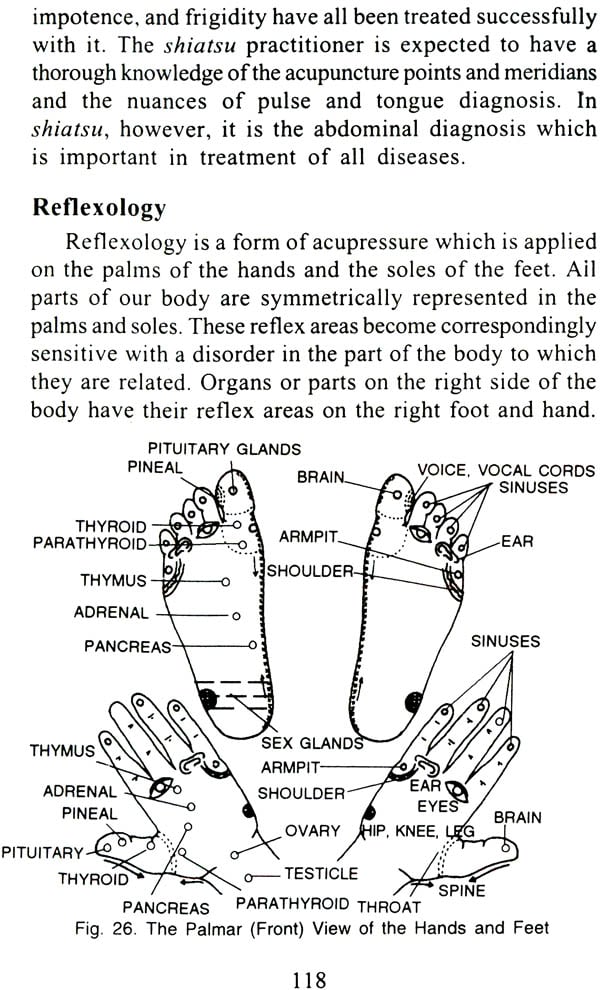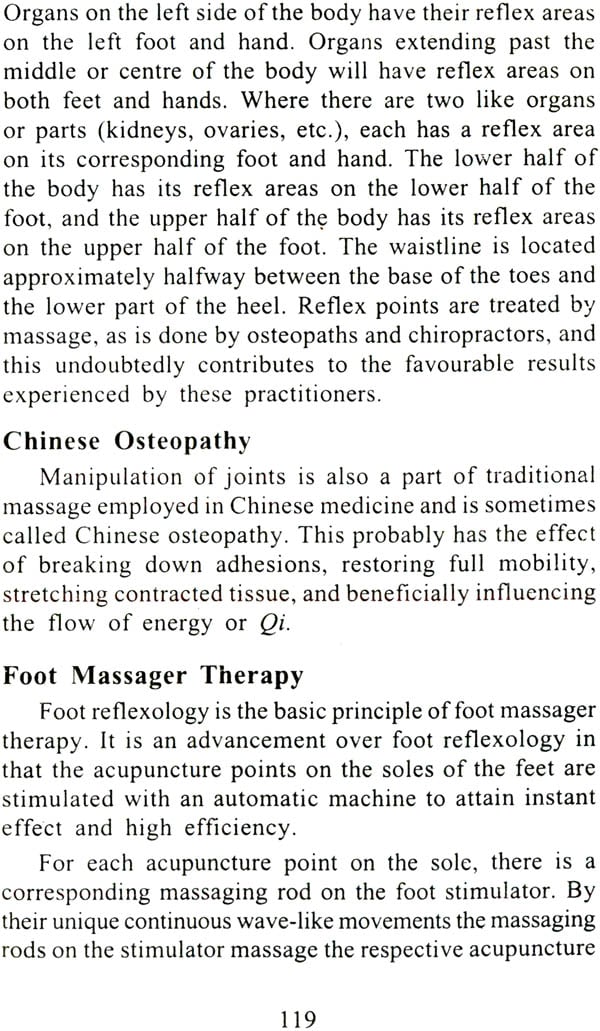
Acupuncture Cure: For Common Diseases
Book Specification
| Item Code: | IDF076 |
| Author: | Dr. Raman Kapur & Dr. Sunita Kapur |
| Publisher: | Orient Paperbacks |
| Language: | English |
| Edition: | 2013 |
| ISBN: | 9788122202328 |
| Pages: | 192 (with Figures) |
| Cover: | Paperback |
| Other Details | 7.1" X 4.8" |
| Weight | 160 gm |
Book Description
For over 3000 years, millions of people in China and elsewhere in Asia have relied on acupuncture to promote, restore, and maintain good health. In the recent times the world outside has also recognized Acupuncture as a complete system of health care. Its effectiveness has now been well documented by the medical and scientific community and its application extends far beyond chronic pain management or as an analgestic.
Central to the concept of acupuncture is the idea that human body is a self-healing dynamic whole, full of energy an vitality which is being constantly regenerated and ebalanced from within. Acupuncture seeks to enhance body's natural healing processes by redirecting or realigning this energy, called Qi (Pronounced 'Chi').
This book by one of India's leading team of practitioners of acupuncture is a comprehensive effort to explain how acupuncture can help in preventing and treating a wide range of physical, psychological, and emotional problems - both common and serious - and many of which modern medicine may not be able to cure. It describes how acupuncture works, its efficacy, the different techniques, and how the use of modern scientific methods has made it amongst the safest and the most effective drugless therapies.
Dr Raman Kapur is one of the few doctors who have successfully combined the practice of modern medicine with acupuncture. After an MBBS degree from Delhi University, he trained in acupuncture in Switzerland and Sri Lanka before starting his practice. Today he runs one of the most successful acupuncture clinics in Delhi. He is also a Senior Honorary Consultant in acupuncture at New Delhi's prestigious Sir Gangaram Hospital.
His research in clinical acupuncture and remarkable success rate in treating chronic diseases won him a gold medal at the 33rd World Congress of Complementary Medicine held in Taiwan in 1992. Author of two books: A Guide to Acupuncture and Tissue Cleansing System and Soft Lasers in Medical Practice, he conducts courses and seminars on Acupuncture, Laser Therapy, Sonopuncture, and Su Jok Acupuncture.
Dr Sunita Kapur, an MBBS from Lady Hardinge Medical College, Delhi University, earned her diploma in acupuncture from Hong Kong. A fellow of the Acupuncture Federation of Korea and China and of the International Laser Therapy Association, she is actively associated in the acupuncture clinic with her husband, Raman Kapur.
"Acupuncture has been practiced for 2000 years to 5000 years. It is no more experimental as a mode of treatment than is the Chinese language as a mode of communication. What is experimental is not Acupuncture, but Western mind's understanding of it and the ability to utilize it properly." - Journal of Traditional Acupuncture USA (Vol. VI, No. 2)
"...acupuncture shows the most promise of all forms of alternative medicine." - National Institute of Health, USA
W hen I graduated in medicine many years ago, I entered the profession full of hope that I would be able to relieve suffering wherever I went. Gradually, however, I came to realise that most of the patients who came to me were being given symptomatic treatment - treatment which made them feel better but could not cure or even arrest the progress of the disease.
This led me to reassess whether Western medicine, which I had spent long years studying, was really the answer to better health. A critical evaluation revealed that the manner in which it was practised made it more symptomatic than curative. While it undoubtedly had effective remedies for certain ailments, especially emergencies and acute bacterial infections, there were a vast number of chronic diseases for which it had no solutions. Over the years, I came across numerous instances where Western medicine not only failed to cure the ailment, but caused considerable damage to the patient. As a result intelligent people everywhere had started exploring and seeking safer, alternative forms of health care which did not involve treatment that was potentially dangerous. This is how I got interested in learning the science of acupuncture.
'Acupuncture' means to cure diseases by puncturing with a needle. The Chinese philosophy of health and healing postulates that it is the energy flow in every living being that is responsible for life. They call this energy Qi. In a person who is sick, the energy flow is obstructed and imbalanced. Acupuncture achieves its curative effect by clearing the obstruction in the flow of Qi and balancing the energy flow. Once this energy flow is restored to normal, the person becomes and stays healthy.
Research and exhaustive studies conducted on acupuncture have brought out various truths. Western medicine, though helpful in certain diseases, has definite side-effects, whereas acupuncture is safe, harmless, and without any side-effects. The classical acupuncture system involves the use of very fine, thin, stainless steel needles at specific points; the system is entirely painless. And for patients who are afraid of needles, children, and women, various needleless techniques are available. Another very effective microsystem of acupuncture is known as Su Jok Acupuncture which can be learnt even by a layman and utilised for treating day-to-day problems. Su Jok Acupuncture utilises only the points on the hands and feet to treat all diseases.
During my two decades of clinical experience, I have treated thousands of patients suffering from various ailments with remarkable results. These range from arthritic and back pains, frozen shoulder, bronchial asthma, headaches and migraine, epilepsy, stomach problems, including ulcers, to different cardiovascular diseases and various kinds of de-addictions.
In addition to the conditions mentioned above, it is important to remember that acupuncture is a complete medical science which can be utilised to treat almost all known diseases and disorders.
This book is primarily intended for the lay person and the non-medical reader who wishes to know more about this ancient, yet very effective system of health care. Any patient who wishes to undergo acupuncture treatment would also find it helpful.
| Preface | ||
| 1. | Acupuncture: The Chinese Tradition of Health and Healing | 13 |
| 2. | The Philosophy of Acupuncture Yin and Yang Qi: Life-Giving Energy Where Qi Comes From The Meridian System Acupuncture Points The Holistic Approach | 25 |
| 3. | Diagnosis in Acupuncture Qi and the Five Elements (Wu Xing) The Sheng and Ke Cycles Diagnostic Criteria in Chinese Medicine Stages of Diagnosis | 53 |
| 4. | Positive Effects of Acupuncture Pain Relief How Acupuncture Controls Pain? Treatment of Neurological Disorders The Homoeostatic Effect Strengthens Immunity, Fights Infections Regulates Physiological and Psychological Functions of the Brain As Local Anaesthesia What Can Acupuncture Treat? | 63 |
| 5. | Needles Used in Acupuncture | 76 |
| 6. | Traditional Acupuncture Teahniques Thrusting Technique Twirling Technique Combination Techniques | 80 |
| 7. | Non-Traditional Acupuncture Techniques Electro-Acupuncture Aquapuncture Homoeopuncture Catgut-Embedding Therapy Point Injection Therapy Bleeding Technique Auto-Immunization Therapy Skin-Embedding Needle Therapy Ear Acupuncture Scalp Acupuncture Hand Acupuncture Wrist and Ankle Acupuncture Nose and Face Acupuncture Periosteal Acupuncture | 85 |
| 8. | Scientific Techniques in Acupuncture Ryodoraku: The Japanese Contribution to Acupuncture | 95 |
| 9. | Needleless Acupuncture Transcutaneous Electro-Acupuncture Stipuncture Acutron Laser Acupuncture Sonopuncture (Ultrasound Puncture) | 100 |
| 10. | Su Jok Acupuncture | 115 |
| 11. | Related Healing Systems Acupressure Shiatsu Reflexology Chinese Osteopathy Foot Massager Therapy Moxibustion: Chinese Herbal Therapy Cupping: The Vacuum Effect | 115 |
| 12. | Cast Histories Cardiovascular Disorders Angina Pectoris Hypertension Hypotension and Palpitations Vascular Disorders Early Piles Varicose Veins with Ulcers Diseases of Muscles, Bones, and Joints Osteoarthritis Rheumatoid Arthritis Cervical Spondylitis Low Backaches Slipped Disc with Sciatica Frozen Shoulder Tennis Elbow Gout Calcaneal Spur (Pain in the Heel) Diseases of the Nervous System Migraines and Common Headaches Epilepsy Parkinson's Disease Insomnia Paralysis in Children Hemiplegia Respiratory Disorders Acute Laryngitis Bronchial Asthma Chronic Sinusitis Disorders of the Gastro-Intestinal System Chronic Gastritis and Peptic Ulcer Irritable Bowel Syndrome Chronic Constipation Menstrual Disorders Skin Diseases Psoriasis Eczema Urticaria Vitiligo Acne Eye Disorders Sjogren's Syndrome Optic Atrophy Psychiatric Disorders General Lethargy and Neurasthenia Anxiety and Depression Impotence Obesity Smoking | 127 |
| 13. | Frequently Asked Questions Bibliography Glossary Appendix | 179 |







